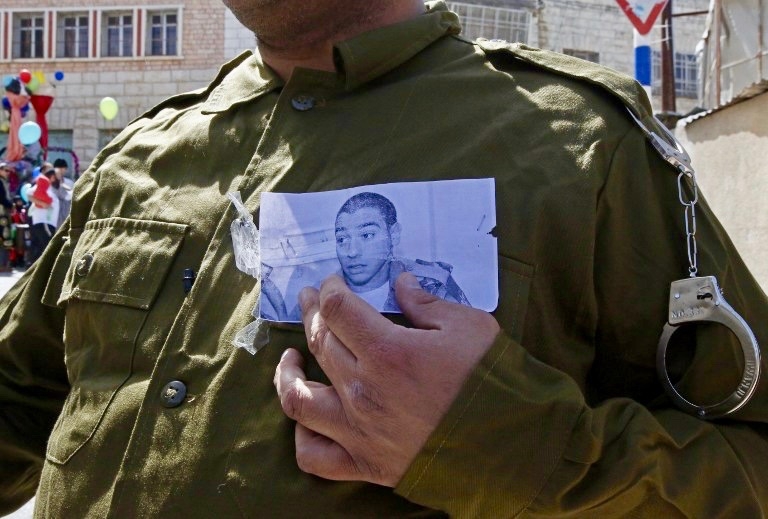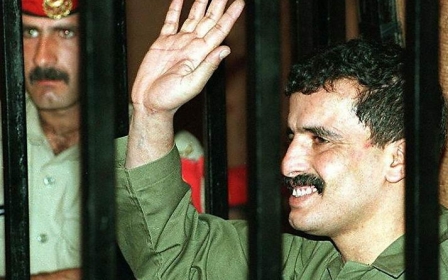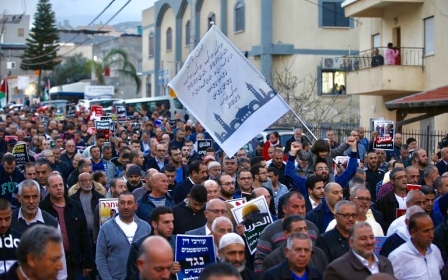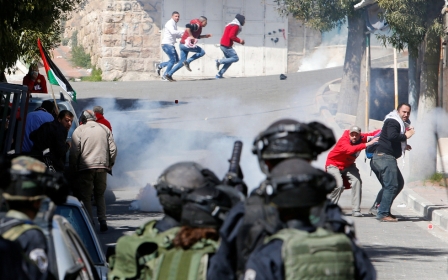Hebron parade features tributes to Israeli soldier convicted of killing

Israeli settlers celebrating a Jewish holiday in the occupied West Bank on Sunday paid tribute to a soldier who shot dead a wounded Palestinian assailant, with some even dressing up as him.
A parade in the city of Hebron for Purim, which sees participants dress up, began at the spot where the shooting which deeply divided Israeli society occurred on the same holiday last year.
The parade traditionally begins there, but this year it took on particular significance - a prominent far-right lawyer dressed up as the soldier, Sergeant Elor Azaria, who has been convicted of manslaughter.
At least one other person also dressed up in tribute to Azaria, and a loudspeaker announcement as the parade began thanked the soldier, drawing cheers from some in the crowd.
The lawyer, Itamar Ben-Gvir, wore an army uniform with a picture of Azaria taped to his chest.
He posed alongside Benzi Gopstein, who heads the far-right group Lehava and who dressed as US President Donald Trump, his hair dyed orange.
Ben-Gvir said their message was that Azaria would have been treated as a hero had the shooting occurred under a Trump presidency.
"It's not possible that a soldier kills a terrorist and he's judged and arrested, and it is simply a disgrace," the 40-year-old said.
Several hundred people took part in the parade in Hebron, where the presence of some 500 Israeli settlers in the heart of the city of some 200,000 Palestinians leads to near-constant tension.
Security was tight, with a large deployment of Israeli soldiers and police.
The military extended the closure on the West Bank imposed for the festival of Purim an extra day, the Times of Israel said.
While border crossings had been slated to open at midnight on Sunday, they will not open until midnight on Monday, the army said. The extension came at the request of political leaders after a security briefing.
"I think it's very normal that people feel that he saved us from a terrorist who tried to kill us, and a lot of people support him," Tzipi Schlissel, 51, who lives down the street from where last year's incident occurred, said of Azaria.
"I think the terrorist who gets support from a lot of people in the world is an evil person that came to kill people, and he can't complain that he got killed when he came to kill other people," added Schlissel, who said her father was killed in an attack years ago.
Despite the tributes to Azaria, the parade was more a celebration than politics, with children and adults dressed as everything from cartoon characters to clowns.
They paraded through a part of the flashpoint city under tight Israeli control, with checkpoints restricting access.
Traditional and dance music blared from speakers, and some drank from whisky or wine bottles. One man leaned against a tree and vomited.
A group of Palestinians watched from a terrace above at one point on the route, a Palestinian flag flapping in the wind above.
Purim celebrates a story from Hebrew scripture in which the Jews of the Persian empire were rescued from annihilation. Every year, Jews celebrate by giving each other presents and wearing costumes.
The March 2016 shooting was caught on video and spread widely online.
It showed Abdul Fatah al-Sharif, 21, lying wounded on the ground, shot along with another Palestinian after the army said he stabbed and wounded a soldier.
Azaria then shot him in the head without any apparent provocation.
The soldier was sentenced by a military court on 21 February to 18 months in jail after an exceptional trial that highlighted deep divisions in public opinion.
He has appealed the conviction, but prosecutors have also appealed the sentence, calling it "excessively lenient".
A number of politicians, including Prime Minister Benjamin Netanyahu, have called for Azaria to be pardoned, despite the military top brass strongly condemning the soldier's actions.
Palestinians have described the shooting as another example of the abuses under Israel's occupation.
A Palestinian operating a souvenir shop near where the parade passed expressed dismay when asked about the support being given to Azaria.
"It's not good that settlers support the soldiers who do these things," said Saddam Ali Jabari, 18.
Middle East Eye propose une couverture et une analyse indépendantes et incomparables du Moyen-Orient, de l’Afrique du Nord et d’autres régions du monde. Pour en savoir plus sur la reprise de ce contenu et les frais qui s’appliquent, veuillez remplir ce formulaire [en anglais]. Pour en savoir plus sur MEE, cliquez ici [en anglais].




